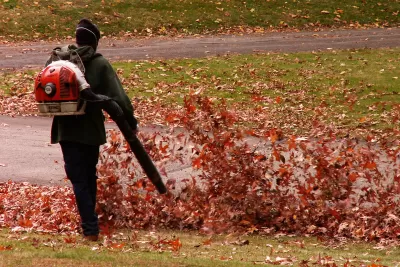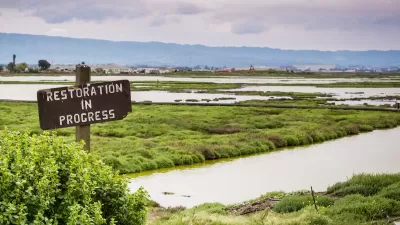Electric and battery-powered leaf blowers have a reduced impact on pollution and human health, but our lawn care practices continue to harm plant and animal habitats.

Dubbing them "mechanical locusts"––with apologies to locusts––that fill the air "with the stench of gasoline and death," Margaret Renkl argues for the abolition of gasoline-powered leafblowers, "the most maddening of all the maddening, environment-destroying tools of the American lawn-care industry."
With their outdated two-stroke engines, leaf blowers emit a massive amount of pollutants like carbon monoxide, smog-forming nitrous oxides, and carcinogenic hydrocarbons. "A 2011 study by Edmunds found that a two-stroke gasoline-powered leaf blower spewed out more pollution than a 6,200-pound Ford F-150 SVT Raptor pickup truck." Aside from pollutants, leaf blowers also emit noise "at levels that can cause tinnitus and hearing loss with long exposure," Renkl writes.
"This month, Gov. Gavin Newsom of California signed a new law making his the first state with plans to ban gas-powered lawn equipment along with other machines, like generators and pressure washers, that use gasoline-powered engines." Around the country, more than 100 cities have passed their own regulations prohibiting gas-powered leaf blowers, and the market share for electric and battery-operated tools is growing rapidly.
But even clean, quiet leaf blowers take a toll on biodiversity, says Renkl. "Leaf blowers, whether electric or gasoline-powered, dislodge the leaf litter that is so essential to insect life — the insect life that in turn is so essential to birds and other wildlife." To protect local ecosystems and biodiversity, Renkl notes, we should leave the leaves alone.
FULL STORY: The First Thing We Do, Let’s Kill All the Leaf Blowers

Alabama: Trump Terminates Settlements for Black Communities Harmed By Raw Sewage
Trump deemed the landmark civil rights agreement “illegal DEI and environmental justice policy.”

Study: Maui’s Plan to Convert Vacation Rentals to Long-Term Housing Could Cause Nearly $1 Billion Economic Loss
The plan would reduce visitor accommodation by 25% resulting in 1,900 jobs lost.

Planetizen Federal Action Tracker
A weekly monitor of how Trump’s orders and actions are impacting planners and planning in America.

Waymo Gets Permission to Map SF’s Market Street
If allowed to operate on the traffic-restricted street, Waymo’s autonomous taxis would have a leg up over ride-hailing competitors — and counter the city’s efforts to grow bike and pedestrian on the thoroughfare.

Parklet Symposium Highlights the Success of Shared Spaces
Parklets got a boost during the Covid-19 pandemic, when the concept was translated to outdoor dining programs that offered restaurants a lifeline during the shutdown.

Federal Homelessness Agency Places Entire Staff on Leave
The U.S. Interagency Council on Homelessness is the only federal agency dedicated to preventing and ending homelessness.
Urban Design for Planners 1: Software Tools
This six-course series explores essential urban design concepts using open source software and equips planners with the tools they need to participate fully in the urban design process.
Planning for Universal Design
Learn the tools for implementing Universal Design in planning regulations.
Caltrans
Smith Gee Studio
Institute for Housing and Urban Development Studies (IHS)
City of Grandview
Harvard GSD Executive Education
Toledo-Lucas County Plan Commissions
Salt Lake City
NYU Wagner Graduate School of Public Service





























